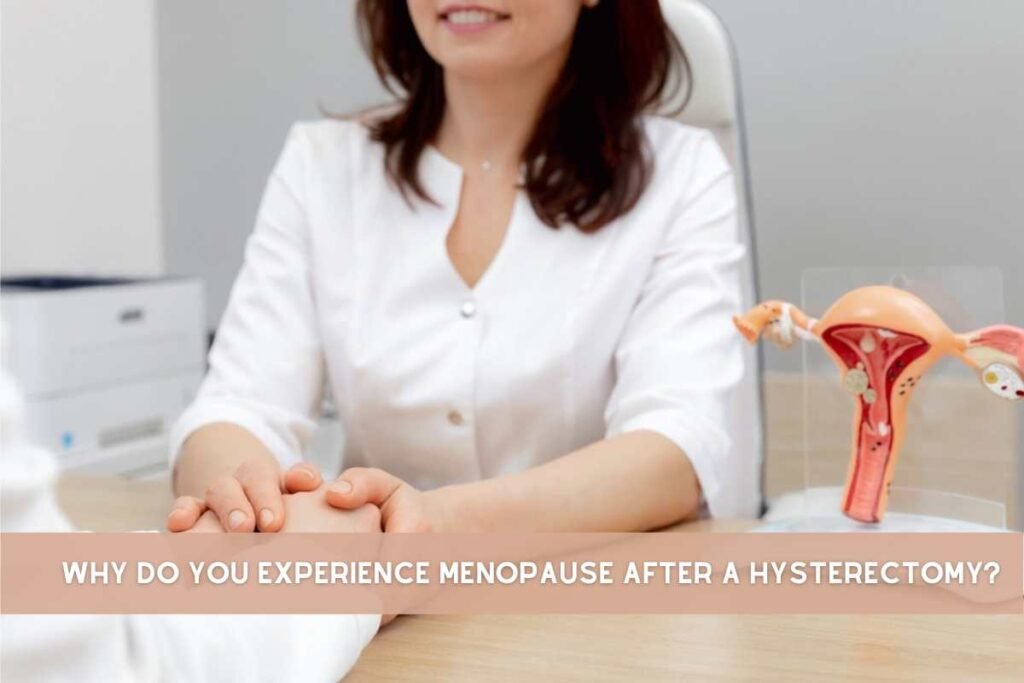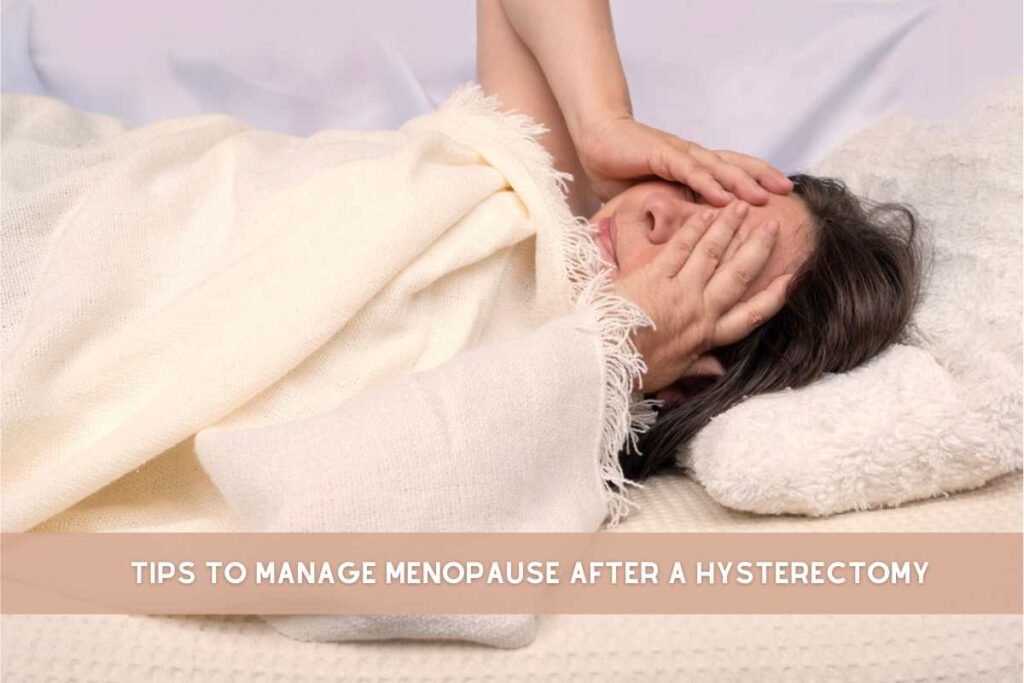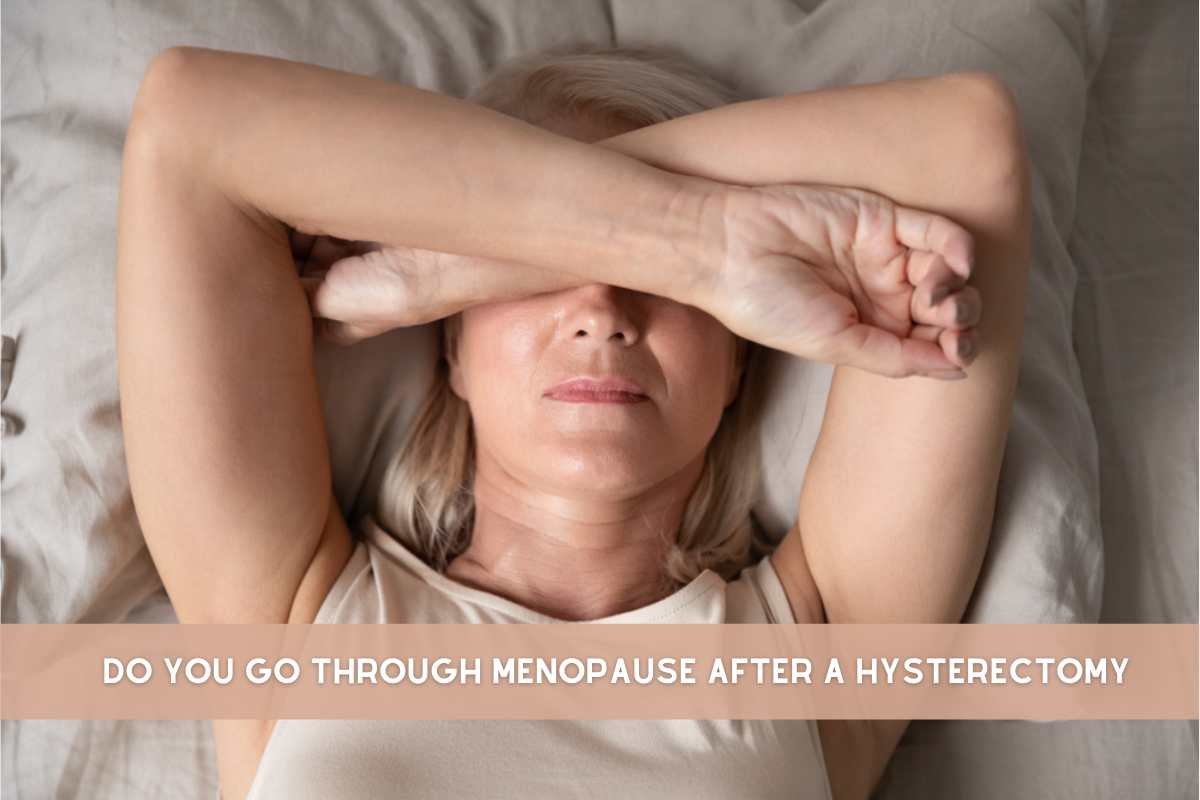A hysterectomy is a common surgery where the uterus is removed. This procedure can have a big impact on a woman’s life, including her hormone levels.
One of the most asked questions many women have is whether they will experience menopause after a hysterectomy. This question arises from the important role that the uterus plays in a woman’s reproductive system.
To address this concern, it’s important to know the different kinds of hysterectomies, how they can affect hormone production, and whether they might cause symptoms commonly linked to menopause.
What is Hysterectomy?
A hysterectomy is a surgical procedure aimed at removing the uterus or womb which is a significant part of the female reproductive system. This operation can be classified into 3 main types: total hysterectomy, subtotal or partial hysterectomy, and radical hysterectomy.
A total hysterectomy involves removing the entire uterus and cervix, while a subtotal hysterectomy only removes the upper part of the uterus, leaving the cervix intact.
A radical hysterectomy is usually performed when cancer is present. This includes removing the entire uterus, tissue on the sides of the uterus, the cervix, and the top part of the vagina.
Note that the onset of menopause after a hysterectomy is mainly dependent on whether or not the ovaries were also removed during the procedure.
Relationship between Menopause and Hysterectomy
Menopause is a natural part of aging that is marked by the end of menstruation and fertility and is typically confirmed when a woman has not had her period for 12 consecutive months. It is caused by a decline in the production of hormones, like estrogen and progesterone, by the ovaries.
A hysterectomy, depending on the type, can potentially induce what’s known as ‘surgical menopause’.
If both the uterus and the ovaries (a procedure known as a hysterectomy with bilateral oophorectomy) are removed, menopause occurs immediately, regardless of the woman’s age, as the body can no longer produce the hormones estrogen and progesterone.
Also Read: Does wegovy affect menstrual cycle? Uncover the Truth
Do you go through menopause after a hysterectomy?
Whether a woman experiences menopause right after a hysterectomy depends on whether one or both ovaries are removed during the surgery. If the ovaries remain intact, they will continue to produce hormones, and menopause will not occur immediately.
The original PROOF study discovered that women who had hysterectomies without removing their ovaries experienced menopause 1.9 years earlier compared to those who kept all their reproductive organs.
If both ovaries are removed during the hysterectomy (bilateral oophorectomy), a woman will enter what’s known as ‘surgical menopause’. This is because the lack of ovaries results in an abrupt drop in the hormones estrogen and progesterone, which triggers the symptoms of menopause.
This sudden change can often cause severe symptoms, like hot flashes and night sweats, that can be more intense than those experienced during natural menopause.
When considering a hysterectomy, women need to have detailed conversations with their doctors about the effects on hormonal health and ways to manage the transition, whether through surgery or natural menopause. Options like Hormone Replacement Therapy (HRT) may be suggested to alleviate symptoms.
Symptoms of menopause after a hysterectomy
After a hysterectomy, the symptoms of menopause are usually similar to those experienced during natural menopause.
However, if both ovaries are removed, these symptoms may occur more suddenly and severely because of the immediate decrease in hormone levels. Some of these symptoms may include:
- Hot flashes and night sweats: These are some of the most common symptoms of menopause. They are sudden feelings of heat in the body, which can cause sweating, especially at night.
- Vaginal dryness: After menopause, when estrogen levels decrease, the vagina may produce less moisture. This causes dryness, discomfort, and pain during sexual intercourse.
- Mood swings: Hormonal changes can affect the regulation of mood. Many women experience mood swings, irritability, anxiety, or depression during menopause.
- Sleep disturbances: Hot flashes and night sweats can disrupt sleep patterns, leading to insomnia and fatigue.
- Bone loss or osteoporosis: A rapid decrease in estrogen levels can lead to an increased rate of bone loss, potentially leading to osteoporosis.
Also Read: Clitoral Pain And Interstitial Cystitis: What’s The Connection?
Why do you experience menopause after a hysterectomy?

The experience of menopause after a hysterectomy happens mostly due to the removal of ovaries, which are responsible for producing hormones like estrogen and progesterone.
When these hormone-producing organs are removed, the body experiences an immediate and significant shift in hormonal balance – the same shift that occurs gradually during natural menopause. Consequently, the sudden stop of hormones can trigger the abrupt onset of menopause symptoms.
Moreover, even when the ovaries are not removed, there may still be a disruption in blood supply to the ovaries after the procedure, which could potentially affect their function.
This causes what we sometimes refer to as ‘subtle menopause’. Hence, it’s not only the removal of ovaries that can lead to menopause post-hysterectomy.
Does everyone go through menopause after a hysterectomy?
Not all women experience menopause following a hysterectomy. If the surgery only involves the removal of the uterus and leaves the ovaries untouched, menopause may not occur immediately.
These women will keep producing the same amount of hormones as before, and the natural process of menopause usually starts around the usual age.
However, one research conducted by the Mayo Clinic suggests that women who have had a hysterectomy, even if their ovaries remain, might experience menopause a few years earlier than typical.
Note that each woman’s experience should be different which depends on several factors like their overall health, genetic predisposition, and lifestyle.
What is the role of HRT in managing menopause after hysterectomy?
Hormone Replacement Therapy (HRT) plays an important role in managing menopause symptoms after a hysterectomy, especially if both ovaries are removed.
HRT involves taking medications that replace the hormones that a woman’s body stops producing during menopause, thereby alleviating its symptoms.
According to the National Institute on Aging, HRT can effectively reduce hot flashes, night sweats, vaginal dryness, and potentially prevent osteoporosis.
However, it’s not without its risks. Potential side effects include a higher risk of blood clots, strokes, and certain types of cancer.
So, it’s important to talk to a doctor before starting HRT. They’ll consider your overall health, how bad your menopause symptoms are, and your personal and family medical history.
Tips to manage menopause after a hysterectomy

Here are some tips that might help you to manage the symptoms of menopause after a hysterectomy:
Lifestyle Changes
Making certain lifestyle changes can greatly help in managing menopause symptoms after a hysterectomy.
Regular exercise, a balanced diet rich in calcium and Vitamin D, and keeping a healthy weight can help relieve symptoms and improve overall well-being. Avoiding triggers like caffeine and alcohol can reduce the frequency and intensity of hot flashes.
Non-Hormonal Medications
Non-hormonal medications can also help manage some menopause symptoms. For example, selective serotonin reuptake inhibitors (SSRIs), a type of antidepressant, can help with hot flashes. Likewise, drugs used to treat osteoporosis can help strengthen bones.
Alternative Therapies
Alternative therapies, like acupuncture, yoga, and meditation, have shown promise in helping manage symptoms of menopause. Acupuncture may help reduce hot flashes, while yoga and meditation can help in managing mood swings and sleep disturbances.
However, it’s crucial to discuss these approaches with your provider before trying them, as not all alternative therapies are suitable for everyone.
Regular Check-ups
Regular check-ups are very important to managing menopause after a hysterectomy. Regular medical assessments allow your healthcare provider to monitor your symptoms, evaluate the effectiveness of your treatment plan, and make necessary adjustments.
This also provides an opportunity to discuss any questions or concerns you may have.
Impacts of hysterectomy on menopause
A hysterectomy can have a great impact on a woman’s experience of menopause which affects not only the physical aspects of her health but also her psychological and emotional well-being.
A sudden menopause symptoms right after surgery can be upsetting and difficult to handle. Women may experience feelings of loss or a decrease in sexual desire due to the changes in their bodies.
Besides, research suggests that early menopause — whether natural or induced by surgery — can increase the risk of cardiovascular diseases and cognitive decline. According to the American Heart Association, women who experience menopause before the age of 45 are more likely to develop heart disease.
A study published in Lancet Neurology also found a link between early menopause and an increased risk of dementia later in life.
So, it’s important for women having a hysterectomy to talk with their provider about how it may affect menopause, the pros and cons of different management options, and the need for lifestyle changes and regular check-ups.
Conclusion
In conclusion, while a hysterectomy may potentially speed up the onset of menopause, not all women will experience this. The impact largely depends on whether the ovaries are removed and an individual’s unique biological and lifestyle factors.
However, many of the symptoms that may arise can be managed effectively through lifestyle modifications, non-hormonal medications, and alternative therapies. Women need to have an open conversation with their doctor about the effects of hysterectomy on menopause. This allows them to make informed decisions about their health.
FAQ
Can a woman have periods after a hysterectomy?
A woman cannot have periods after a hysterectomy because the uterus, which sheds its lining during a menstrual cycle, is removed during the procedure. This means menstruation will cease permanently following a hysterectomy.
What happens when you have a hysterectomy but keep your ovaries?
If a woman has a hysterectomy but keeps her ovaries, she will not experience the hormonal shifts associated with menopause immediately. The ovaries will continue to produce hormones until the natural age of menopause unless other health issues arise that impact ovarian function.
What happens to your hormones after a full hysterectomy?
After a full hysterectomy, where both the uterus and ovaries are removed, a woman will stop producing the hormones estrogen and progesterone. When hormone levels suddenly decrease, it can cause menopausal symptoms like hot flashes, night sweats, and dryness. Hormone replacement therapy can help relieve these symptoms.
Do you go through menopause after a partial hysterectomy?
After a partial hysterectomy, where the uterus is removed but the ovaries remain, a woman will not go through menopause immediately. The ovaries will continue to produce hormones, so the onset of menopause will likely occur at the natural age, although some research suggests it may occur a few years earlier. However, since menstruation is no longer possible without a uterus, the usual signs of menopause (the cessation of periods) will not be present.

Dr. Usman is a medical content reviewer with 12+ years of experience in healthcare research and patient education. He specializes in evidence-based health information, medications, and chronic health topics. His work is based on trusted medical sources and current clinical guidelines to ensure accuracy, transparency, and reliability. Content reviewed by Dr. Usman is for educational purposes and does not replace professional medical advice.
